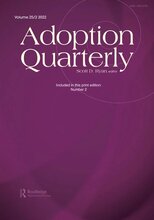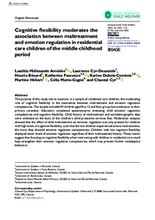This page contains documents and other resources related to children's care in the Americas. Browse resources by region, country, or category.
Displaying 291 - 300 of 3191
A large proportion of children in the foster care system experience placement instability, which works against the three national goals for children in the child welfare system: permanency, safety, and well-being. Placement instability has been linked with increased child externalizing behaviors and increased parenting stress. Child-Parent Relationship Therapy (CPRT) is one intervention which combats issues associated with placement instability. The authors outline the needs of children and families in the foster care system, the benefits of relationship-focused play therapy interventions, and provide rationale for the use of CPRT among child welfare agencies.
Concurrent planning is a process by which all options for permanency are considered simultaneously for children in foster care. Children are placed with caregivers (resource parents) who are open to adoption if reunification with birth parents does not occur. This U.S.-based quantitative study explored resource parents’ perceptions of the concurrent planning process via surveys at two time points. Participants included resource parents of 77 infants assessed at 2 months and 1 year after placement.
The directors of Alaska’s Department of Health and Social Services (DHSS) and Office of a Children’s Services (OCS) face a proposed class action lawsuit that alleges the state’s child welfare system has “long failed” those in foster care, in particular Alaska Native children.
The U.S. and Canada are facing a reckoning over their use of boarding schools to assimilate Indigenous children. A US government report released last week found at least 53 burial sites at boarding schools containing hundreds of graves, with officials expecting to discover thousands more.
Last week, the U.S. Department of the Interior released a more than 100-page report on the federal Indigenous boarding schools designed to assimilate Native Americans in the late 19th and the early 20th centuries. Between 1819 and 1969, the U.S. ran or supported 408 boarding schools, the department found. Students endured “rampant physical, sexual, and emotional abuse,” and the report recorded more than 500 deaths of Native children—a number set to increase as the department’s investigation of this issue continues.
The Haiti Family Care Network will be providing opportunities for collaboration, advocacy, resource sharing and educational forums/training for organizations working with children, youth, families and communities in Haiti.
Black and Latinx youth are more likely to be placed into foster care compared to non-Latinx white youth. Foster care placement can facilitate mental health service use, yet youth from marginalized and oppressed racial and ethnic groups in foster care are still less likely to receive mental health services compared to non-Latinx white youth. This study aims to examine this discrepancy Black and Latinx youth face by testing (a) whether mental health need moderates the relationship between race or ethnicity and foster care placement and (b) whether race or ethnicity moderates the relationship between foster care placement and mental health service use.
A U.S. government investigation into the dark history of Native American boarding schools has found "marked or unmarked burial sites" at 53 of them, Interior Secretary Deb Haaland said on Wednesday.
The purpose of this study was to examine, in a sample of residential care children, the moderating role of cognitive flexibility in the association between maltreatment and emotion regulation competencies. The sample included 69 children aged 8 to 12 and their group home educator as their primary caretaker. Educators completed questionnaires evaluating child emotion regulation competencies and cognitive flexibility.
This study provides an overview of the family reunification process of Latinx adolescents who have migrated to join their families in the United States.



